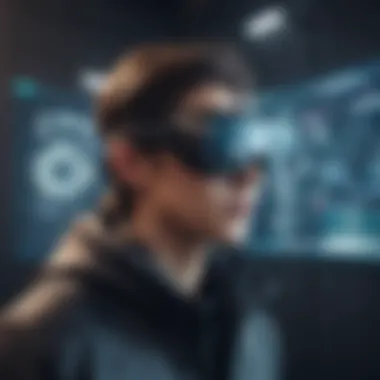Unveiling the Revolutionary Metaverse Goggles: A Dive into Immersive Tech


Overview of Metaverse Goggles in Immersive Technology
Metaverse goggles have emerged as groundbreaking tools in the realm of immersive technology, transforming our digital experiences and transcending traditional boundaries. These futuristic goggles bridge the gap between virtual reality and augmented reality, offering users a seamless blend of real and digital worlds. The importance of metaverse goggles lies in their ability to create immersive environments where users can interact with virtual elements as if they were part of the physical world. By donning these goggles, individuals can explore 3D landscapes, engage in interactive experiences, and immerse themselves in unprecedented digital realms.
Key features and functionalities of metaverse goggles encompass a wide array of technologies, including high-resolution display screens, motion tracking sensors, and advanced spatial mapping capabilities. These features work in harmony to deliver a truly immersive experience, allowing users to move, interact, and engage with virtual objects in a natural and intuitive manner. Additionally, metaverse goggles often incorporate haptic feedback mechanisms, spatial audio technology, and gesture recognition systems to enhance the sense of presence and realism within virtual environments.
The use cases and benefits of metaverse goggles are multifaceted, spanning various industries and applications. From virtual meetings and remote collaboration to immersive gaming experiences and virtual tourism, these goggles offer a versatile platform for innovation and creativity. In the healthcare sector, metaverse goggles are revolutionizing medical training, patient therapy, and surgical simulations, while in the education sector, they are transforming learning experiences and remote education delivery. The benefits of metaverse goggles extend beyond entertainment and productivity, providing users with new ways to engage with digital content, collaborate with others, and explore limitless virtual possibilities.
Introduction to Metaverse Goggles
The exploration of Metaverse Goggles in immersive technology opens the doorway to a realm brimming with innovative possibilities. In this article, we unravel the transformative impact of Metaverse Goggles on our digital experiences, dissecting their journey from inception to their profound influence across diverse industries. By shedding light on virtual reality (VR) and augmented reality (AR), this comprehensive guide aims to provide a nuanced understanding of how these advanced technologies are reshaping our digital landscape.
Understanding the Concept of Metaverse
Defining the Metaverse
Delving into the realm of Metaverse begins with a profound exploration into its definition, serving as the cornerstone of immersive technology. The essence of defining the Metaverse lies in its ability to encapsulate a virtual, shared space where individuals interact in real-time, transcending physical boundaries. This characteristic distinguishes the Metaverse as a dynamic and interconnected digital universe, offering a plethora of opportunities for social engagement and experiential learning. The unique feature of defining the Metaverse lies in its capacity to redefine traditional notions of online presence, fostering a sense of presence and interconnectedness among users. However, its evolving nature poses both advantages and challenges, requiring a delicate balance to harness its full potential.
Evolution of Virtual Realities
The evolution of virtual realities marks a crucial phase in the journey of immersive technologies, shaping the landscape of Metaverse Goggles. As we trace the history of virtual realities, we witness a progressive shift from rudimentary virtual environments to sophisticated, interactive digital realms. The key characteristic of this evolution lies in its continuous adaptation to technological advancements, propelling VR and AR into the forefront of digital innovation. Embracing the evolution of virtual realities offers a gateway to unparalleled experiences, blurring the lines between physical and digital realities. While this progression holds immense promise for immersive technology, it also introduces complexities in terms of user engagement and interface design, necessitating a nuanced approach to ensure seamless integration.
Emergence of Metaverse Goggles
Tech Innovations Driving Metaverse Adoption
The emergence of Metaverse Goggles is propelled by a wave of technological innovations that have revolutionized the immersive experience. Tech innovations driving Metaverse adoption encompass a myriad of advancements, ranging from enhanced display capabilities to cutting-edge sensory integration. At the core of this phenomenon lies a commitment to enhancing user engagement and immersion, redefining the boundaries of virtual experiences. The key characteristic of these tech innovations is their ability to blur the lines between physical and digital realities, offering users a seamless transition into the Metaverse. However, this transformative change presents its own set of challenges, requiring careful consideration of user preferences and interactions to optimize the immersive experience.
Features of Next-Gen Goggles
The features of next-gen goggles herald a new era of visual technologies, redefining how we perceive and interact with the digital world. These cutting-edge features encompass a diverse range of functionalities, from high-resolution displays to intuitive control mechanisms, culminating in a truly immersive experience. The key characteristic of next-gen goggles is their emphasis on realism and fidelity, elevating virtual interactions to unprecedented levels of authenticity. By integrating state-of-the-art features, such as advanced tracking systems and ergonomic design, these goggles offer users a glimpse into the limitless possibilities of immersive technology. Yet, navigating the landscape of next-gen features requires a delicate balance between innovation and practicality, ensuring that users can seamlessly integrate these technologies into their daily experiences.
Significance in Immersive Experiences


Enhancing Virtual Reality Applications
The significance of Metaverse Goggles in enhancing virtual reality applications is rooted in their ability to transcend traditional boundaries of visual and sensory experiences. By leveraging advanced display technologies and spatial tracking systems, these goggles offer users a gateway to immersive worlds that blur the lines between fiction and reality. The key characteristic of enhancing virtual reality applications lies in their capacity to simulate complex environments with enhanced realism, providing users with an unparalleled sense of presence and engagement. However, optimizing these applications requires a nuanced understanding of user behaviors and preferences, ensuring that the immersive experience remains seamless and intuitive.
Applications in Augmented Reality
The applications of Metaverse Goggles in augmented reality herald a new era of interactive experiences, fusing digital elements with the physical world. By superimposing digital information onto real-world environments, these goggles offer users a unique perspective on their surroundings, enriching their perception of reality. The key characteristic of applications in augmented reality lies in their capacity to enhance situational awareness and information dissemination, revolutionizing how users interact with their environment. However, integrating these applications requires careful consideration of user contexts and interaction models, ensuring that augmented reality experiences are immersive, informative, and enriching.
Technological Advancements
In the realm of metaverse goggles, technological advancements play a pivotal role in shaping the landscape of immersive experiences. From enhancing the visual quality to improving user interaction, these advancements are at the forefront of innovation. By focusing on specific elements such as optics, sensors, and connectivity, metaverse goggles are pushing the boundaries of what is possible in virtual and augmented reality realms. The benefits of these advancements extend to providing users with a more realistic and engaging experience, creating new opportunities for various industries to leverage this cutting-edge technology. However, considerations about the integration of these technologies remain crucial to ensure seamless compatibility and performance in diverse applications.
Optics and Display Technologies
Resolution and Field of View
Resolution and Field of View define the visual quality and immersive potential of metaverse goggles. The sharpness of images and the extent of the user's view are key characteristics that directly impact the overall experience. A high resolution coupled with a wide field of view ensures clarity and depth in virtual environments, making it a popular choice for users seeking realistic simulations and detailed visuals. However, the downside may include higher hardware requirements and potential display limitations that could affect performance. Despite these challenges, Resolution and Field of View remain essential for delivering a truly immersive experience in this digital landscape.
Lightweight Lens Design
The Lightweight Lens Design contributes to the comfort and usability of metaverse goggles. By reducing the overall weight and pressure on the user's face, this design element aims to enhance extended usage without discomfort. Its key characteristic lies in providing a seamless visual experience while minimizing strain on the wearer. This design choice is beneficial for extended VR sessions or professional applications where user comfort is paramount. However, potential disadvantages may include cost implications and durability concerns related to lightweight materials. Balancing these aspects is crucial to optimize user experience while maintaining the durability and quality of the goggles.
Sensors and Tracking Systems
Precise Motion Tracking
Precise Motion Tracking contributes to the seamless interaction and motion capture capabilities of metaverse goggles. The accuracy and responsiveness of tracking systems are pivotal in translating real-world movements into virtual environments with precision. Its key characteristic of capturing subtle gestures and movements makes it a popular choice for interactive applications and immersive experiences. The advantage of precise motion tracking lies in its ability to create a more natural and intuitive user interface. However, potential disadvantages may include technical complexities and calibration requirements that could affect overall performance. Striking a balance between accuracy and user-friendliness is essential for harnessing the full potential of this technology.
Integration of Biometric Sensors
The Integration of Biometric Sensors adds a new dimension to metaverse goggles by monitoring user vitals and enhancing personalized experiences. By capturing essential data such as heart rate and body temperature, these sensors provide insights into user engagement and well-being during immersive sessions. Its key characteristic of adapting experiences based on user biometrics offers a tailored and adaptive environment for users. The benefit of biometric sensor integration lies in promoting user health and safety while optimizing engagement with virtual content. However, challenges may arise concerning data privacy and calibration accuracies that require careful consideration for widespread adoption. Finding the right balance between personalization and data security is essential for the successful implementation of biometric sensors in metaverse goggles.
Connectivity and Processing Power
5G Integration


5G Integration revolutionizes the connectivity and streaming capabilities of metaverse goggles. By leveraging high-speed networks, users can experience seamless interactions and real-time content delivery without latency issues. The key characteristic of 5G integration lies in providing fast and reliable connections for a truly immersive experience. This choice is beneficial for applications requiring instant data transfer and high-definition content streaming. However, challenges such as coverage limitations and network stability may impact the widespread adoption of 5G in metaverse technology. Balancing connectivity requirements with user demands is crucial to unlocking the full potential of 5G integration in metaverse goggles.
Advancements in Chipsets
Advancements in Chipsets enhance the processing power and efficiency of metaverse goggles, shaping the speed and capability of these devices. By incorporating cutting-edge chipsets, these goggles can handle complex computations and graphics rendering with ease. The key characteristic of advanced chipsets is their ability to support high-fidelity visuals and smooth interactions in virtual environments. This choice is beneficial for demanding applications such as gaming and simulations requiring real-time processing. However, potential disadvantages related to overheating and power consumption may pose challenges in optimizing performance. Striking a balance between processing capabilities and energy efficiency is crucial for ensuring optimal functionality and user satisfaction with advanced chipsets in metaverse goggles.
Applications Across Industries
When delving into the expansive realm of metaverse goggles, exploring their applications across various industries is paramount. These cutting-edge devices are not only reshaping digital experiences but also revolutionizing sectors like gaming, entertainment, healthcare, education, business, and communication. The significance lies in their ability to immerse users in virtual worlds, enhancing engagement, learning, collaboration, and productivity across different fields.
Gaming and Entertainment
Immersive Gameplay Experiences
Immersive gameplay experiences offered by metaverse goggles are a game-changer in the gaming and entertainment industry. These experiences transport users to fantastical realms where they interact with environments and characters in unprecedented ways. The key characteristic of immersive gameplay is the total immersion it offers, blurring the lines between reality and virtuality. This level of immersion captivates users, keeping them engaged for extended periods. However, there are considerations regarding the potential disconnection from actual reality and its impact on user behavior.
VR Cinema and Streaming Platforms
In the realm of virtual reality cinema and streaming platforms, metaverse goggles play a crucial role in delivering cinematic experiences like never before. Users can immerse themselves in virtual movie theaters, watch live concerts, or engage with interactive narratives. The key characteristic is the sense of presence these platforms provide, making users feel as though they are part of the content. While this offers a unique viewing experience, there are challenges related to content quality and the potential for sensory overload.
Healthcare and Education
Surgical Training Simulations
Metaverse goggles are transforming surgical training through realistic simulations that allow medical professionals to practice procedures in a safe and controlled environment. The key characteristic is the hands-on experience these simulations offer, enabling surgeons to hone their skills without risking patient safety. This immersive training method enhances surgical competency and could potentially reduce medical errors. However, concerns exist regarding the fidelity of simulation compared to real-life surgery.
Virtual Classrooms and Laboratories
In the realm of education, virtual classrooms and laboratories powered by metaverse goggles are revolutionizing the learning experience. Students can engage in immersive lessons, explore virtual artifacts, and conduct experiments in a virtual setting. The key characteristic is the interactivity that these platforms offer, fostering student engagement and understanding. While this technology opens new possibilities for remote learning, there are challenges related to equitable access and the digital divide.
Business and Communication
Virtual Meetings and Conferences
Metaverse goggles enable virtual meetings and conferences that transcend geographical boundaries, allowing professionals to collaborate in immersive digital environments. The key characteristic is the sense of presence and interaction these platforms provide, mimicking face-to-face encounters. This enhances communication and fosters team collaboration. Yet, there are considerations regarding the effectiveness of virtual communication compared to in-person interactions.


Remote Collaboration Tools
Remote collaboration tools integrated with metaverse goggles offer innovative ways for teams to work together from disparate locations. The key characteristic is the seamless integration of virtual workspace features, enabling real-time collaboration on projects. This improves productivity and enables flexible work arrangements. Nonetheless, challenges exist in ensuring data security and maintaining a sense of team cohesion in virtual environments.
Challenges and Future Prospects
In this segment of the article, we delve into the vital theme of Challenges and Future Prospects within the realm of metaverse goggles. Understanding and addressing the obstacles and potential advancements in immersive technology is crucial for shaping the future landscape. By analyzing the specific elements and benefits associated with overcoming challenges and embracing future prospects in this domain, we paint a comprehensive picture of the path ahead.
Overcoming User Experience Hurdles
Addressing Motion Sickness
Addressing Motion Sickness stands as a pivotal aspect of enhancing user experience in immersive technology. The ability to tackle this prevalent issue significantly impacts the overall user satisfaction and comfort while engaging with metaverse goggles. Its effectiveness in reducing discomfort during extended virtual experiences and its recognition as a practical solution make it a popular choice for addressing this challenge. The unique feature of providing relief from motion-induced discomfort and enhancing prolonged immersion showcases its advantages in promoting a seamless user interaction in this article.
Improving Interaction Design
Improving Interaction Design plays a critical role in refining the user interface within immersive technology. By optimizing the way users engage with metaverse goggles, the overall user experience is elevated to new heights. Its key characteristic of offering intuitive and user-friendly interactions makes it a favorable choice for enhancing the overall usability of these advanced devices. The unique feature of streamlining user engagement and its seamless integration into the immersive experience highlights its advantages in optimizing interaction design within this article.
Regulatory and Ethical Considerations
Incorporating Regulatory and Ethical Considerations is paramount in navigating the complex landscape of metaverse technology. Addressing aspects such as data privacy concerns and content moderation challenges is essential for ensuring user safety and compliance with ethical standards. By highlighting the key characteristics and importance of these considerations, this article sheds light on the significance of maintaining ethical practices and regulatory compliance in the development and utilization of metaverse technology.
Data Privacy Concerns
Data Privacy Concerns represent a fundamental aspect of maintaining user trust and safeguarding sensitive information in immersive technology. The emphasis on protecting personal data and ensuring secure data handling practices is a beneficial choice for upholding privacy standards within this article. The unique feature of enhancing data security and mitigating privacy risks underscores its advantages in safeguarding user information and fostering a secure digital environment.
Content Moderation Challenges
Addressing Content Moderation Challenges is essential for promoting a positive and safe user experience within the metaverse. By effectively managing and filtering user-generated content, platforms can mitigate harmful or inappropriate material, preserving a conducive virtual environment. Its key characteristic of implementing content moderation policies and tools underscores its importance in maintaining platform integrity and user wellbeing. The unique feature of fostering a secure and respectful online community showcases its advantages in promoting responsible content sharing within this article.
Future Innovations and Trends
Exploring Future Innovations and Trends offers a glimpse into the evolving landscape of metaverse technology and its potential impact on immersive experiences. By examining advancements such as Integration with AI and IoT and AR Cloud Development, we uncover the transformative potential of these technologies in reshaping the future of virtual and augmented realities. Highlighting their key characteristics and unique features, this article provides insights into the advantages and considerations of embracing these cutting-edge innovations in the realm of immersive technology.
Integration with AI and IoT
Integration with AI and IoT signifies a symbiotic relationship between immersive technology and artificial intelligenceinternet of things. This collaboration enhances the capabilities of metaverse goggles by infusing intelligent algorithms and interconnected devices. The key characteristic of providing personalized and adaptive experiences underscores its benefits in optimizing user engagement and content delivery. The unique feature of enabling context-aware interactions and data-driven insights showcases its advantages in leveraging AI and IoT integration to enrich immersive experiences within this article.
AR Cloud Development
AR Cloud Development is revolutionizing the virtual landscape by introducing persistent and shared augmented reality experiences. By establishing a digital mirror world overlaying the physical environment, users can interact with immersive content seamlessly. The key characteristic of creating spatially aware and interactive overlays highlights its advantages in bridging physical and digital realities. The unique feature of enabling collaborative and persistent AR experiences underscores its benefits in fostering social connections and spatial computing advancements within this article.



